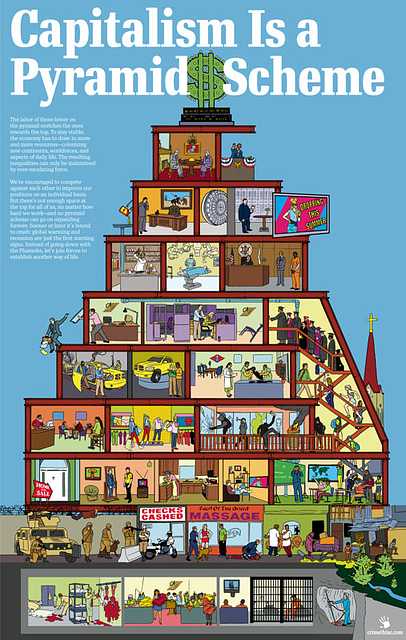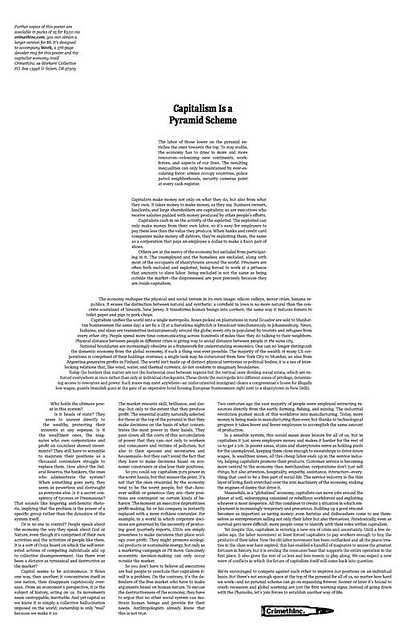A large full-color poster based on the classic illustration of the pyramid of the capitalist system published in the Industrial Worker in 1911. With the assistance of Packard Jennings, we’ve created a new version, much more detailed than the original and updated to account for all the transformations of the past one hundred years. A stand-alone poster as well as a companion to our Work book, the back contains a concise essay dissecting capitalism as we live it.
The labor of those lower on the pyramid enriches the ones towards the top. To stay stable, the economy has to draw in more and more resources—colonizing new continents, workforces, and aspects of daily life. The resulting inequalities can only be maintained by ever-escalating force.
We’re encouraged to compete against each other to improve our positions on an individual basis. But there’s not enough space at the top for all of us, no matter how hard we work—and no pyramid scheme can go on expanding forever. Sooner or later it’s bound to crash: global warming and recession are just the warning signs. Instead of going down with the Pharaohs, let’s join forces to establish another way of life.
The labor of those lower on the pyramid enriches the ones towards the top. To stay stable, the economy has to draw in more and more resources—colonizing new continents, workforces, and aspects of our lives. The resulting inequalities can only be maintained by ever-escalating force: armies occupy countries, police patrol neighborhoods, security cameras point at every cash register.
Capitalists make money not only on what they do, but also from what they own. It takes money to make money, as they say. Business owners, landlords, and large shareholders are capitalists; so are executives who receive salaries padded with money produced by other people’s efforts.
Capitalists cash in on the activity of the exploited. The exploited can only make money from their own labor, so it’s easy for employers to pay them less than the value they produce. When banks and credit card companies make money o debtors, they’re exploiting them, the same as a corporation that pays an employee a dollar to make a $200 pair of shoes.
Others are at the mercy of the economy but excluded from participating in it. The unemployed and the homeless are excluded, along with most of the occupants of shantytowns around the world. Prisoners are o en both excluded and exploited, being forced to work at a pittance that amounts to slave labor. Being excluded is not the same as being outside the market—the dispossessed are poor precisely because they are inside capitalism.
The economy reshapes the physical and social terrain in its own image: silicon valleys, motor cities, banana republics. It erases the distinction between natural and synthetic: a corn eld in Iowa is no more natural than the concrete wasteland of Newark, New Jersey. It transforms human beings into workers, the same way it reduces forests to toilet paper and pigs to pork chops.
Capitalism unifies the world into a single metropolis. Roses picked on plantations in rural Ecuador are sold to Manhattan businessmen the same day; a set by a DJ at a Barcelona nightclub is broadcast simultaneously in Johannesburg. News, fashions, and ideas are transmitted instantaneously around the globe; every city is populated by tourists and refugees from every other city. People spend more time communicating across hundreds of miles than they do talking to their neighbors. Physical distance between people in different cities is giving way to social distance between people in the same city.
National boundaries are increasingly obsolete as a framework for understanding economics. One can no longer distinguish the domestic economy from the global economy, if such a thing was ever possible. The majority of the wealth of many US corporations is comprised of their holdings overseas; a single task may be outsourced from New York City to Mumbai; an idea from Argentina generates profits in Finland. The world isn’t made up of distinct physical territories or political bodies; it is a sea of interlocking relations that, like wind, water, and thermal currents, do not conform to imaginary boundaries.
Today the borders that matter are not the horizontal ones between regions but the vertical ones dividing social strata, which are enforced everywhere at once rather than only at individual checkpoints. These divide the metropolis into different zones of privilege, determining access to resources and power. Such zones may meet anywhere—an undocumented immigrant cleans a congressman’s house for illegally low wages, guards brandish guns at the gate of an expensive hotel housing European businessmen right next to a shantytown in New Delhi.
Who holds the ultimate power in this system?
Is it heads of state? They seem to answer directly to the wealthy, protecting their interests at any expense. Is it the wealthiest ones, the magnates who own corporations and profit on countless shrewd investments? They still have to scramble to maintain their positions as a thousand contenders struggle to replace them. How about the Federal Reserve, the bankers, the ones who administrate the system? When something goes awry, they seem as powerless and distraught as everyone else. Is it a secret conspiracy of tycoons or Freemasons? That sounds like lingering anti-Semitic rhetoric, implying that the problem is the power of a specific group rather than the dynamics of the system itself.
Or is no one in control? People speak about the economy the way they speak about God or Nature, even though it’s comprised of their own activities and the activities of people like them. It is a sort of Ouija board on which the self-interested actions of competing individuals add up to collective disempowerment. Has there ever been a dictator as tyrannical and destructive as the market?
Capital seems to be autonomous. It flows one way, then another; it concentrates itself in one nation, then disappears capriciously overseas. From an economist’s perspective, it is the subject of history, acting on us. Its movements seem unstoppable, inevitable. And yet capital as we know it is simply a collective hallucination imposed on the world; ownership is only “real” because we make it so.
The market rewards skill, brilliance, and daring—but only to the extent that they produce profit. The essential quality naturally selected for those at the top of the pyramid is that they make decisions on the basis of what concentrates the most power in their hands. They pass down all the costs of this accumulation of power that they can—not only to workers and consumers and victims of pollution, but also to their spouses and secretaries and housemaids—but they can’t avoid the fact that they have to make decisions based on economic constraints or else lose their positions.
So you could say capitalism puts power in the worst hands, but that misses the point. It’s not that the ones rewarded by the economy tend to be the worst people, but that—however selfish or generous they are—their positions are contingent on certain kinds of behavior. The moment an executive deprioritizes profit-making, he or his company is instantly replaced with a more ruthless contender. For example, in a world in which corporate decisions are governed by the necessity of producing good quarterly reports, CEOs are simply powerless to make decisions that place ecology over profit. They might promote ecological products or sustainable energy, but only as a marketing campaign or PR move. Genuinely ecocentric decision-making can only occur outside the market.
So you don’t have to believe all executives are bad people to conclude that capitalism itself is a problem. On the contrary, it’s the defenders of the free market who have to make arguments based on human nature. To excuse the destructiveness of the economy, they have to argue that no other social system can motivate human beings and provide for their needs. Anthropologists already know that this is not true.
Two centuries ago the vast majority of people were employed extracting resources directly from the earth: farming, fishing, and mining. The industrial revolution pushed much of this workforce into manufacturing. Today, more money is being made in manufacturing than ever, but thanks to technological progress it takes fewer and fewer employees to accomplish the same amount of production.
In a sensible system, this would mean more leisure for all of us, but in capitalism it just saves employers money and makes it harder for the rest of us to get a job. In poorer areas, slums and shantytowns serve as holding pools for the unemployed, keeping them close enough to sweatshops to drive down wages. In wealthier zones, all this cheap labor ends up in the service industry, helping capitalists promote their products. Customer service is becoming more central to the economy than merchandise; corporations don’t just sell things, but also attention, hospitality, empathy, assistance, interaction—everything that used to be a free part of social life. The service industry is the thin layer of living flesh stretched over the iron machinery of the economy, stoking the engines of desire that drive it.
Meanwhile, in a “globalized” economy, capitalists can move jobs around the planet at will, sidestepping unionized or rebellious workforces and exploiting whoever is most desperate. All this combines to create a situation in which employment is increasingly temporary and precarious. Building up a good résumé becomes as important as saving money; even baristas and dishwashers come to see themselves as entrepreneurs selling not only their labor but also themselves. Paradoxically, even as survival gets more difficult, more people come to identify with their roles within capitalism.
Yet despite this, capitalism is entering a new era of crisis and uncertainty. Until a few decades ago, the labor movement at least forced capitalists to pay workers enough to buy the products of their labor. Now the old labor movement has been out flanked and all the peace treaties in the class war have expired; this has enabled a handful of magnates to amass the greatest fortunes in history, but it is eroding the consumer base that supports the entire operation in the first place. It also gives the rest of us less and less reason to play along. We can expect a new wave of conflicts in which the future of capitalism itself will come back into question.
We’re encouraged to compete against each other to improve our positions on an individual basis. But there’s not enough space at the top of the pyramid for all of us, no matter how hard we work—and no pyramid scheme can go on expanding forever. Sooner or later it’s bound to crash: recession and global warming are just the first warning signs. Instead of going down with the Pharaohs, let’s join forces to establish another way of life.

